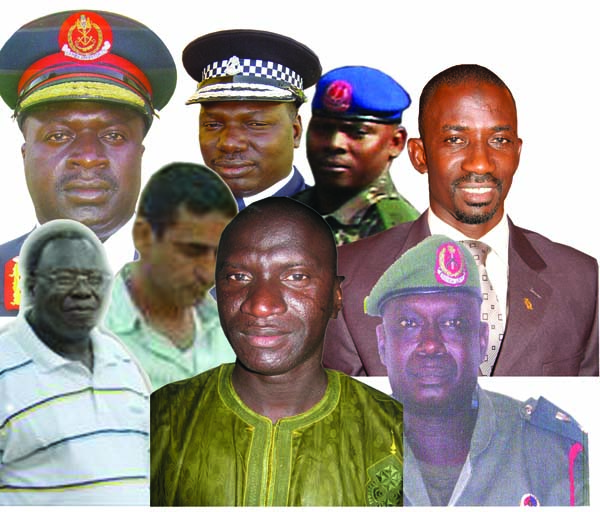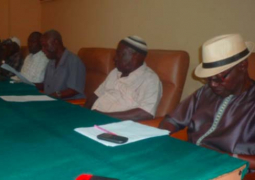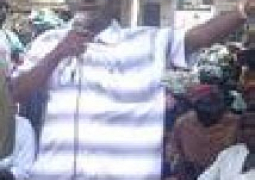
Justice Emmanuel Amadi of the high court in Banjul yesterday convicted and sentenced Lt. Gen Lang Tombong Tamba and seven others to death. The trial judge convicted them on two counts, for conspiracy and treason.
The other convicted persons are Bri. Gen Omar Bun Mbye, Col. Lamin Bo Badjie, Lt. Col. Kawsu Camara alias Bombardier, Modou Gaye, a former deputy IGP, Gibril Ngorr Secka, a diplomat, Abdoulie Joof and Yusuf Ezziden alias Rambo, both businessmen.
Justice Emmanuel Amadi in passing sentence declared that the convicts would suffer death as prescribed by law.
He also announced that they have a right to appeal against the conviction and sentence.
In his four-hour judgment, Justice Amadi started by stating that on 19th March 2010 information about eight accused persons was filed before the court by the state prosecutors, and went on to read the charges preferred against the accused persons, as contained in the indictment filed by the state prosecutors.
The judge noted that the prosecution called 16 witnesses, and that at the end of the prosecution's case, the defence made a no-case-to-answer submission, which was overruled by the court, which ordered the accused persons to enter into their defence.
The trial judge went on to summarise the evidence, as adduced by all the prosecution witnesses and the accused persons. The judge noted that the accused persons opened their defence, and did not call any witness in support of their case.
Justice Amadi further stated that, at the end of the defence testimony, both parties filed written briefs addressed to the court.
"I had earlier reproduced in court the offences under which the accused persons are charged with," Justice Amadi said. He said defence counsel PC Secka, in his address, stated that count three is bad in law. He said counsel had cited a Court of Appeal decision, and argued that count three should be struck out.
"I have read the Court of Appeal decision, and agreed with the defence counsel that count three is bad and, subsequently, struck out count three," he added.
Justice Amadi stated that, as regards count one, which is conspiracy, in order to succeed the prosecution must prove that there was an agreement between the accused persons. He said PW1 (Ebrima Marreh) in his evidence said that the 1st, 2nd, 3rd, 5th, 7th, and 8th accused persons held meetings at the residence of the 1st accused (Lang Tombong) in Kololi for the purpose of the coup plot.
He said the evidence before the court had revealed that PW1 is familiar with the 1st accused.
Justice Amadi added that the evidence of PW1 (Ebrima Marreh) is consistent and accurate. He said it is only a member of that group who would know the insiders, adding that PW1 is a member of the group of the accused persons, and that the court believed in his evidence. The 1st accused admitted knowing all the rest of the accused persons, and is a personal friend of the 8th accused, the judge continued.
Justice Amadi further stated that DPP Chenge in his written brief submitted that PW2 is not an accomplice, but defence counsel Hawa Sisay-Sabally submitted that PW1 and PW2 were accomplices, and that their evidence cannot be considered by the court. Justice Amadi went further to cite the Evidence Act with regards to accomplices. He summarised the evidence of PW2, and concluded that PW2 was not an accomplice. He said PW2 in his evidence stated that he is a businessman of all sorts, and that the court believes his evidence as credible.
Justice Amadi stated that the issue of conspiracy has been established by the prosecution, and that the evidence of PW1 Ebrima Marreh and PW2 Rui Jabbi Kassama has been corroborated.
"I hold that the prosecution has proved charges of conspiracy against the accused persons."
He said the 6th accused and Kukoi have engaged PW2 to train mercenaries in a foreign land for the purpose of a coup, adding that, on the training of mercenaries, the court believes the evidence of PW2.
Justice Amadi stated that PW2 testified that he knows the 6th accused, and PW3 also testified that he knows the 6th accused, and that his evidence remained unchallenged. The evidence of PW2 and PW3 corroborated, said the judge.
He said the 6th accused knows PW2, and his denial of knowing him (PW2) was a lie.
Justice Amadi went on to state that the accused persons? defence constituted a denial of their involvement. He further stated, in his judgement, that the 6th accused and Kukoi Samba Sanyang have engaged a marabout in Guinea-Bissau who, the judge added, was used as the spiritual mercenary.
Justice Amadi in his judgment added that PW1 (Ebrima Marreh) at this age would not take the risk to go Farefenni without some people being behind him.
It would interest readers to know that, as the judge was reading his judgement, lights went out twice for a few minutes and that, when this happened, he continued reading with the aid of a torchlight and the torch from two mobile phones.
"I hold that the prosecution has proved its case against the accused persons, and the court has also found them guilty on count one and two as charged," Justice Amadi declared in summing up his four-hour judgement.
Hawa Sisay Sabally counsel for Yusuf Ezziden alias Rambo in a plea of mitigation told the court that his client is sick, and that the court has discretion under section 29 sub section 1 of the Criminal Code. She cited sections 2 and 3 of Criminal Code to further convince the trial judge.
"I urge your lordship to fine my client, rather than sending him to jail considering the time my client spent in custody," counsel submitted.
In his plea of mitigation on behalf of his clients, SM Tambedou for the 1st and 4th accused said the 1st accused Lang Tombong Tamba has given 23 years of service to The Gambia, adding that he is married with two wives and children, and the entire family depend on him. He urged the court to impose a lesser sentence on the accused person.
Concerning the 4th accused, Kawsu Camara alias Bombardier, counsel said he lost both his parents, has served this country for a long time, and is married with three wives and children. He is entirely responsible for their extended family, counsel added. He urged the court to impose a lesser sentence on him.
PC Secka for the 2nd 3rd 4th 5th and 7th accused also urged the court to temper justice with mercy.
Counsel said the 7th accused is 68 years old, has three wives, and suffers from ill health.
Concerning the 2nd 3rd, 5th and 6th accused persons, PC Secka said they are people who has served the Gambia armed forces for more or almost 20 years, and have been described as loyal and disciplined soldiers.
He added that they are also married, with wives and children, and urged Justice Amadi to impose a lighter sentence.
The Director of Public Prosecutions, Richard N. Chenge, who appeared with his deputy, Mikailu Abdullai, said the accused persons have no criminal record.
Justice Amadi in passing sentence later, pronounced the death sentenced on all the accused persons.
Mood at the court room and premises
The court room and even the high court premises in and out in the street was full, as relatives and friends of the accused persons, and members of the general public, among them media personnel, turned out to hear the judgement. The security was tight, with screening before entering the court premises.
Before the judge finished pronouncing his verdict, relatives of the accused persons started crying and wailing. Some collapsed outside the courtroom, shortly after the verdict was read out.
Some family members who collapsed could be seeing being put in vehicle and rushed away, apparently to the nearest hospital.
Readers would recall that the 8th men were arraigned at the high court in Banjul on 19th March 2010, and that the trial commenced on 22nd March 2010. It lasted for nearly five months.
The indictment stated that the accused persons between January and December 2009 procured arms, ammunition, equipment and mercenaries from Guinea Conakry and other places to stage a coup and overthrow the democratically-elected government of The Gambia.
About death penalty
According to records, since independence the death penalty was only carried out once in The Gambia, and this was in 1981, after the abortive coup attempt led by Kukoi Samba Sanyang. The person executed was Mustapha Danso, a convicted paramilitary officer, for his part in the killings which occurred during the coup attempt. However, few years later, the death penalty was abolished, during the First Republic. The death penalty was re-introduced early in the Second Republic, in August 1995, but has never been carried out to date.



